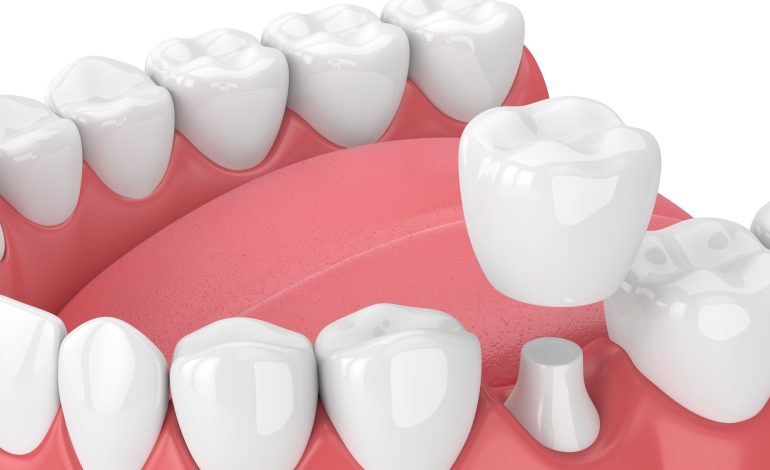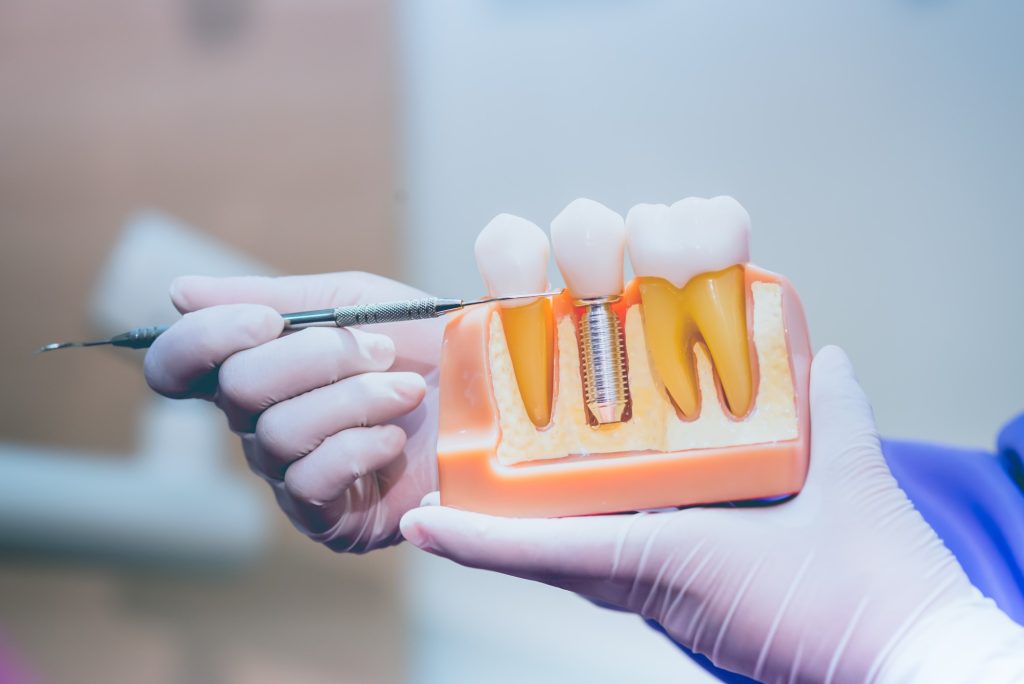Understanding The Lifespan Of Porcelain Crowns

In restorative dentistry, dental crowns have become an essential tool. Acting as a protective cover, crowns envelop damaged teeth, allowing individuals to eat, smile, and talk without discomfort or self-consciousness. This form of dental restoration opens up a new world of opportunities for those plagued by dental issues, restoring their teeth and confidence.
Porcelain crowns have emerged as a popular choice in dental crowns. Known for their natural appearance and durability, they offer a highly aesthetic solution for those needing dental restoration.
For anyone considering this treatment, it’s essential to understand the lifespan of porcelain crowns. This knowledge empowers patients to make informed decisions and appropriately care for their restored smiles. This article will discuss porcelain crowns in detail and help you understand their lifespan.
History Of Porcelain Crowns
The first documented use of porcelain crown was by Dr. Charles H. Land, a Detroit-based dentist. He created the porcelain “jacket” crown, a thin porcelain cap to fit over a damaged tooth, which was fragile and complex to produce but valued for its aesthetic appeal. This marked a significant advancement in restorative dentistry.
The mid-20th century saw porcelain-fused-to-metal (PFM) crowns, combining porcelain’s natural look with metal’s durability, which became popular in restorative dentistry. In recent years, all-ceramic and zirconia crowns have emerged, offering superior strength and aesthetics to traditional porcelain crowns. The evolution of porcelain crowns highlights the ongoing innovation in dentistry to improve oral health and aesthetics.
The Composition Of Porcelain Crowns
Porcelain, a type of ceramic composed mainly of kaolin, feldspar, and quartz, forms the essence of a porcelain crown. The materials are heated to high temperatures and then cooled, forming a hard, glass-like substance. The porcelain is then molded and colored to match the patient’s natural teeth.
Porcelain stands out for several reasons when compared to other crown types. While metal crowns are known for their strength, they lack the natural appearance of porcelain crowns. Resin crowns, on the other hand, can match the look of natural teeth but are less durable. Zirconia crowns offer both strength and aesthetics, but they tend to be more expensive.
Porcelain crowns bring to the table both aesthetics and durability. They look just like natural teeth, a significant advantage for those conscious about their appearance. However, they can be more brittle than metal or zirconia crowns and are susceptible to cracking if not properly cared for. Therefore, you should always work with reliable dentists, such as those at Durango dentist, to ensure the installation of the crown is done properly.
Expected Lifespan Of Porcelain Crowns
Several factors come into play when determining the lifespan of porcelain crowns. Material, oral hygiene, lifestyle habits, and professional maintenance all play a role. Despite these variables, We can estimate how long you can expect a porcelain crown to last.
The durability of porcelain crowns is one of their most appealing attributes. These crowns can last 10 to 15 years with proper care and maintenance. However, it’s essential to note that this is just an average. A porcelain crown could exceed 20 years of service with exceptional care, underscoring the importance of diligent oral hygiene and regular dental visits.
Benefits Of Porcelain Crowns
Porcelain crowns are more than just a remedy for dental issues. They bring several advantages, which range from enhancing one’s aesthetics to improving oral health. This section will discuss each of these benefits in detail.
- Aesthetic Appeal
Porcelain crowns are lauded for their aesthetic appeal, primarily because they mimic the appearance of natural teeth. They reflect light similarly to your natural enamel, which makes them almost indistinguishable from the rest of your teeth.
With their ability to be customized to the exact color and shape of a patient’s tooth, porcelain crowns help ensure that the patient’s smile remains consistent and beautiful, boosting their self-confidence and overall satisfaction.
- Durability
Porcelain crowns are known for their impressive durability. High-quality porcelain is resistant to chipping and cracking, making these crowns a durable dental solution.
With good oral hygiene and regular dental check-ups, porcelain crowns can withstand the normal wear and tear of chewing and biting for many years, often lasting a decade or longer, depending on various factors such as the patient’s oral habits and the quality of the dental work.
- Comfort And Compatibility
Porcelain crowns offer a high level of comfort as they can be shaped to match the original tooth perfectly. This allows a more natural fit within the mouth, making eating and speaking more comfortable.”
Regarding compatibility, porcelain is a biocompatible material, meaning it is not likely to cause any allergic reactions. This makes it suitable for patients with sensitivities or allergies to certain metals used in other types of crowns.
- Improvement In Oral Health
Porcelain crowns serve as an effective solution for restoring a tooth that has been severely damaged or decayed. By covering the damaged tooth, the crown provides a shield against further damage or decay, helping to preserve the patient’s oral health.
Additionally, porcelain crowns can help to maintain the alignment of the teeth. When a tooth is lost or removed, other teeth may shift into the space, causing misalignment. A porcelain crown can help keep the remaining teeth in their correct positions by filling this space.
Through these multiple benefits, porcelain crowns serve a functional purpose and significantly enhance the patient’s oral health and well-being.

Factors Affecting the Lifespan Of Porcelain Crowns
Like any dental restoration, the lifespan of porcelain crowns is not solely dependent on the material itself. Many factors come into play, including:
- Oral Hygiene
Taking care of one’s oral health is paramount when maintaining porcelain crowns. Regular brushing and flossing are essential. These practices help remove food particles and plaque around the crown, preventing decay in the remaining natural tooth and gum disease.
In addition to the daily oral care routine, mouthwash can provide an extra layer of protection. Antibacterial mouthwashes help eliminate bacteria that could harm the tooth supporting the crown or surrounding teeth. It’s important to remember, though, mouthwash is not a substitute for brushing or flossing but a supplement to a comprehensive oral hygiene regimen.
- Individual Habits
Individual habits have a substantial impact on the longevity of porcelain crowns. Activities that put excessive pressure on the teeth, such as teeth grinding (bruxism) or nail-biting, can weaken and even fracture porcelain crowns. Thus, it’s essential to be aware of these habits and take steps to mitigate them, for instance, by wearing a nightguard if teeth grinding is an issue.
Dietary habits also factor in. Consuming hard or sticky foods can stress the crown more, increasing the risk of damage. Furthermore, a diet high in sugar and acidic foods can erode the tooth structure around the crown, which could ultimately lead to crown failure. Opting for a balanced diet, rich in fruits, vegetables, and lean proteins and low in sugary or acidic foods, can help extend the life of a porcelain crown.
- Dental Check-Ups
Regular dental check-ups are pivotal in ensuring the longevity of porcelain crowns. These routine visits allow dentists to monitor the condition of the crown, spotting any potential issues before they become serious problems.
In addition to monitoring, dentists can provide professional cleanings, removing plaque and tartar build-up that regular brushing and flossing may miss. These cleanings can be particularly beneficial in maintaining the health of the gum line around the crown, an area susceptible to bacterial accumulation.
- Dentist’s Skill and Experience
Lastly, the skill and experience of the dentist placing the crown significantly affect the crown’s lifespan. A well-fitted crown, appropriately aligned with the bite and adjacent teeth, will have less risk of failure than a poorly fitted one.
Choosing a dentist with extensive experience placing porcelain crowns can make a significant difference. A skilled dentist will ensure that the crown is placed correctly, fits well, and matches the appearance of natural teeth, which can contribute to its longevity.
Comparison With Other Dental Crown Types
To fully understand the lifespan of porcelain crowns, comparing them to other dental crown materials is beneficial. This comparison clarifies why porcelain may be your choice, despite other options on the market.
- Porcelain vs. Metal Crowns
Metal crowns, typically made from gold or a base metal alloy, are known for their impressive longevity. Often, they can last between 20 to 30 years, outliving porcelain crowns on average. This durability stems from the metal’s resilience to chipping or breaking.
However, metal crowns do not provide the same natural appearance as porcelain crowns, often appearing distinctly different from the surrounding teeth. Consequently, they’re less favored for front teeth restorations where aesthetics are paramount.
- Porcelain vs. Zirconia Crowns
Zirconia crowns are a more recent addition to the dental crown market. They offer an aesthetic appeal like porcelain crowns but boast a lifespan on par with metal crowns, often exceeding 20 years. However, their cost can be prohibitive for some, making porcelain crowns a more affordable yet visually appealing alternative.
- Porcelain vs. Resin Crowns
Resin crowns are often the most affordable dental crown option. They can be shaped and colored to resemble natural teeth, providing a satisfactory aesthetic result. However, they fall short in terms of longevity. Typically, resin crowns last around 5 to 7 years, significantly less than porcelain, zirconia, or metal crowns.
Maintaining Porcelain Crowns
Maximizing the lifespan of porcelain crowns significantly depends on their post-placement care. Just like natural teeth, crowns need regular cleaning and maintenance to keep them in top condition. Here are some essential routines and practices that can help maintain and extend the life of your porcelain crowns.
- Detailed Oral Care Routines
At the forefront of maintaining porcelain crowns is a comprehensive daily oral care routine. This practice involves brushing your teeth twice a day using a soft-bristled toothbrush. Soft bristles are gentler on both the crowns and your gums, helping prevent gum recession which could expose the base of the crown.
Flossing should also be a daily habit. Flossing is critical for removing food particles and plaque from between the teeth and around the crown, areas your toothbrush can’t reach effectively. Remember, while the crown itself can’t decay, the tooth beneath it can, and good flossing habits are vital in preventing this.
- Professional Dental Cleaning And Maintenance
Beyond at-home care, professional dental cleanings and check-ups are crucial to maintaining porcelain crowns. Dentists have the tools and skills to perform a more thorough cleaning than you can achieve at home, removing plaque and tartar build-up that could potentially harm the tooth supporting the crown.
Additionally, regular dental check-ups allow your dentist to monitor the state of your crown, catching any issues like chipping or loosening early before they become more significant problems. Your dentist can also provide tips tailored to your needs and situation, ensuring you do everything possible to care for your crown.
- Dietary Considerations
What you eat can impact the longevity of your porcelain crowns. It’s advisable to avoid hard or crunchy foods that could cause damage, like ice or hard candies. Sticky foods, like caramel and taffy, can also be problematic as they can pull at and dislodge the crown. Instead, opt for a balanced diet that’s gentle on your teeth and nourishes your body.
It’s also worth noting that while porcelain is stain-resistant, it can still become discolored over time, mainly if you consume a lot of dark beverages like coffee, tea, or red wine. Moderating your intake of these drinks and rinsing your mouth with water after consuming them can help keep your crown looking bright and natural.
- Lifestyle Habits
Lastly, some of your habits can impact the condition and lifespan of your porcelain crowns. If you grind your teeth at night, consider a night guard to protect your crown from excessive pressure and potential damage. Similarly, if you play sports, a mouth guard can be invaluable in protecting your crown from potential injury.
Tobacco use, both smoking, and chewing, can lead to a host of oral health issues, including gum disease and oral cancer, and can shorten the lifespan of your porcelain crown.
The same goes for excessive alcohol consumption, which can weaken your enamel and increase the risk of damage to your crown. Modifying these habits can improve your crown’s longevity and oral health.
Conclusion
Porcelain crowns are a valuable solution for restoring the aesthetics and functionality of damaged teeth. Understanding their composition, the factors that affect their lifespan, and how they compare with other types of crowns can help you make informed dental decisions.
Porcelain crowns can last many years with diligent oral hygiene, regular dental check-ups, mindful lifestyle choices, and professional maintenance. Ultimately, a commitment to thorough and ongoing care is the cornerstone to extending the lifespan of your porcelain crowns.
Author : Dr. Olivia Reynolds
Dr. Olivia Reynolds is a renowned dentist and expert in restorative dentistry. With extensive experience in working with porcelain crowns, Dr. Reynolds has deep knowledge of their lifespan and durability. Drawing on her expertise, Dr. Reynolds provides valuable insights into the maintenance and care required to extend the lifespan of porcelain crowns, helping patients make informed decisions about their dental health. When she’s not in the dental office, Dr. Reynolds enjoys traveling, exploring new cuisines, and spending time with her family.




